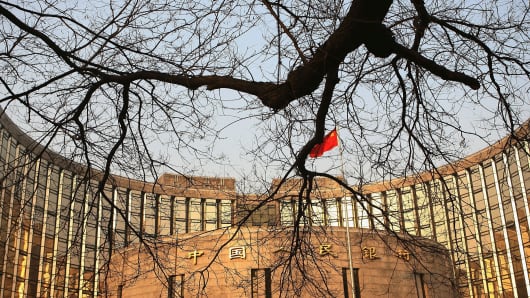China's central bank moved earlier this week to drain liquidity from the market for the first time in eight months, leading to speculation over whether the world's second largest economy has embarked on a tightening cycle.
"The very fact that the PBOC (People's Bank of China) conducted the draining operation is a hawkish signal. Clearly, the central bank is trying to send a message that it will not tolerate too easy liquidity conditions," Dariusz Kowalczyk, senior economist and strategist, at Credit Agricole CIB said.
The PBOC let a net $145.89 billion drain from the interbank market this week and returned to using longer-term forward repos to drain funds, instead of reverse repos which inject funds, for the first time since June. This spooked investors and led to a 3 percent fall in China's benchmark index on Thursday, with the Shanghai Composite opening lower on Friday as well.
(Read more:
China Shares Slump 3% on Tightening Fears
)
Kowalczyk said in a note that he expects the central bank will try to tighten liquidity to curb inflation and
home prices
this year. He also expects two hikes to the main interest rates in the second half of the year.
Louis Kuijs, China economist, RBS, also said that there was a possibility of monetary tightening in the second half of the year, even though he expects monetary policy to remain on hold in the coming months.
"If we start to see the [economic] recovery really taking off, then later in the year, we can expect some tightening measures," Kuijs said.
Following a year tainted by uncertainty, China entered 2013 on positive note supported by a slew of upbeat data like annual economic growth rebounding to 7.8 percent in the fourth-quarter – snapping seven straight quarters of weaker expansion. Signs the economy has turned the corner after a raft of pro-growth policies kicked in late last year, has led economists to predict that China will grow more than 8 percent this year.
In late December, however, the PBOC warned that China would stick to a "prudent" monetary policy in 2013 to keep inflation stable after cutting interest rates and the reserve requirement ratio (RRR) for banks twice each last year. The consumer price index (CPI) rose to a seven-month high of 2.5 percent in December from a year earlier.
(Read more:
China Inflation Accelerates – Time to Remove the Punch Bowl?
)
But despite the recent move by the PBOC, Shuang Ding, senior China economist, Citi Investment Research, doesn't see a major shift in China's policy stance, but rather a "normalization" of the monetary policy.
"I think going forward it seems that the capital inflow may have resumed that is why the central bank purchased a lot of foreign exchange in December and possibly in January," Ding said. "If the capital flows continue, the central bank may not need to cut the reserve requirement ratio and they may even have to withdraw the liquidity they attracted from the foreign exchange market by, for example, the repo rate."
Kuijs of RBS, meanwhile, said there's more chance that the central bank will crack down on China's shadow banking system than significantly tighten its core monetary policy stance.
"Policymakers have expressed concerns in recent months about the shadow banking systems and I would not be surprised if those concerns lead them to look closer and perhaps start to work on containing again the financial activity that takes place in that shadow banking system," Kuijs said.
(Read more: Shadow Banking Facing Tougher Regulations)
—By CNBC.com's Rajeshni Naidu-Ghelani; Follow her on Twitter @RajeshniNaidu


